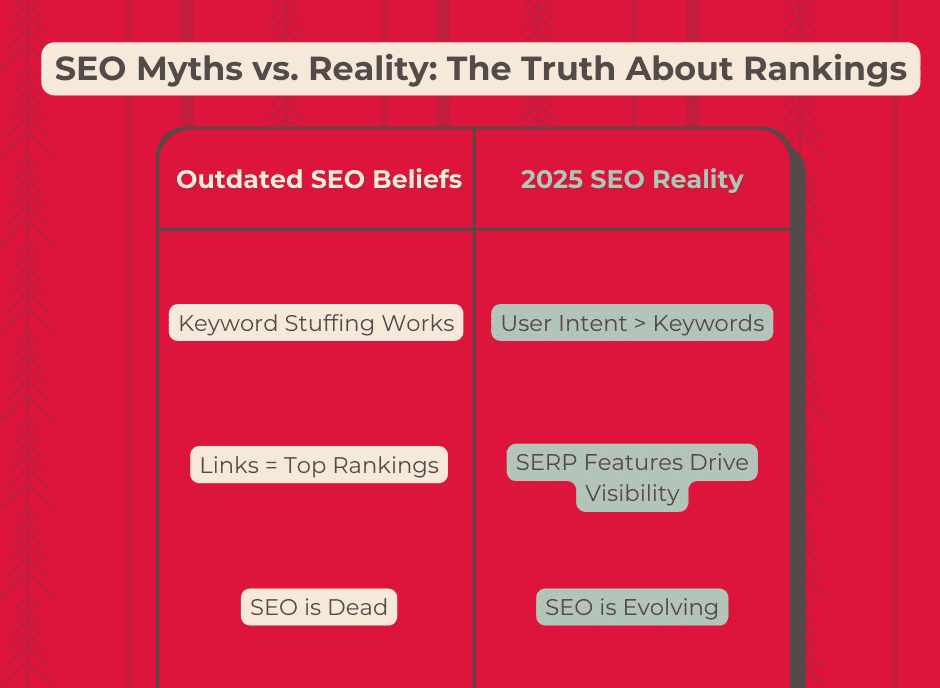Links Are Overrated
Traditionally, backlinks have been the cornerstone of SEO strategies. However, the digital terrain is shifting. Search engines are increasingly prioritizing SERP features and AI-generated summaries, often overshadowing organic links. This evolution suggests that while high-quality backlinks remain valuable, their influence is diminishing in the face of enriched search results.
Diversify Traffic Sources
Relying solely on backlinks is like putting all your eggs in one basket—risky and limiting. While links still have value, they’re no longer the only factor driving search visibility. Instead, focus on a multi-channel approach to attract and retain your audience:
- Content Marketing: High-quality, informative content—such as blogs, whitepapers, and video tutorials—can position your brand as an authority and industry thought leaders while driving organic traffic.
- Social Media Marketing: Platforms like LinkedIn, Instagram, and TikTok are search engines in their own right, especially for the younger generation. Engaging content expands your reach and creates brand recall beyond traditional search.
- Influencer Collaborations: Partnering with trusted voices in your audience’s digital communities drives referral traffic, builds brand credibility, and increases brand exposure in ways backlinks alone cannot.
- Email Marketing & Community Engagement: Building a loyal audience through newsletters, webinars, and exclusive content ensures you have a direct line of communication beyond search rankings.
By leveraging multiple traffic sources, you create a more sustainable, adaptable digital presence that doesn’t hinge on a single algorithm update.
Optimize for SERP Features
Search results pages (SERPs) are no longer just a list of blue links. Featured snippets, map packs, knowledge panels, image carousels, and AI-generated overviews now dominate search real estate—meaning if you’re not optimizing for them, you’re missing out on significant visibility. Here’s how to set your SEO content up for success, with increased potential for SERP features:
- Featured Snippets: Structure your content with clear, concise answers to commonly asked questions. Use bullet points, numbered lists, and well-formatted headings to increase your chances of being pulled into position zero.
- Knowledge Panels & Google Business Profile: Ensure your brand and business information is accurate and complete across all platforms, especially Google Business Profile, Wikipedia, and authoritative directories.
- People Also Ask (PAA) Optimization: Many users interact with PAA sections for quick answers—by crafting content that addresses related questions, you can capture additional traffic.
- Video & Image SEO: Google increasingly prioritizes multimedia content, so optimizing video titles, descriptions, and alt text for visual search can give your brand an edge.
 In search, winning isn’t just about ranking high—it’s about strategically positioning your content where users are most likely to engage, and helping improve your website’s visibility on Google through enhanced SERP optimization.
In search, winning isn’t just about ranking high—it’s about strategically positioning your content where users are most likely to engage, and helping improve your website’s visibility on Google through enhanced SERP optimization.
Stop Obsessing Over Keywords
The era of keyword stuffing is behind us (well, for most of us). Modern search algorithms are now adept at understanding context and intent. Focusing excessively on exact-match keywords can detract from content quality and user experience, and the platforms can discern that more and more.
Prioritize User Intent Over Keywords
Instead of obsessing over keyword density, focus on delivering relevant, valuable content that aligns with search intent. Before creating content, determine whether users are looking for information (informational intent), comparing options (commercial intent), or ready to make a decision (transactional intent), and tailor your content accordingly. It’s also important to answer questions thoroughly, by structuring content to provide clear, in-depth answers. Using FAQ sections, bullet points, and direct responses that can be featured in search snippets are ways to do this. Instead of forcing keywords, write naturally for better readability (humans are the end readers, remember). Use subheadings, concise paragraphs, and engaging visuals to keep users on the page longer—an important ranking factor. By aligning content with user intent rather than rigid keyword placement, you improve website visibility and create a better experience for both search engines and human readers.
Embrace Semantic SEO for More Impactful Content
Google no longer matches exact keywords to queries—it understands the relationships between words and topics (again, it’s “smarter” than ever). Semantic SEO ensures that your content is recognized as comprehensive, authoritative, and valuable. Instead of repeating the same keyword across a content piece, incorporate related, natural variations, long-tail keywords, and industry jargon to provide depth. Remember, blog posts are not isolated pieces; they are spokes of a topic cluster (hub), so it’s important to connect related content through internal linking. This signals to search engines that you’re an authority in your industry. Another aspect of semantic SEO is AI-powered search. The best way to ensure your content is structured to align with these new formats is to include concise explanations, well-labeled sections, and clearly defined takeaways. By shifting from a keyword-centric approach to a topic-driven strategy, you’ll create content that resonates with both search engines and human readers.
Brand Authority Is Everything
In a saturated marketplace, brand trustworthiness is a critical differentiator in 2025. Search engines favor established brands, associating them with reliability and quality.
Continue Building Brand Authority to Stay Competitive
SEO isn’t just about optimizing individual pages—it’s about establishing your brand as a trusted source. Google increasingly favors brands that demonstrate expertise, authority, and trustworthiness (E-E-A-T). If your brand isn’t recognized as a reliable source, even high-quality content may struggle to rank. Whether it’s your website, social media, or email campaigns, your brand’s voice should be cohesive. Inconsistency can weaken trust and recognition. To cultivate a strong online presence, actively share thought leadership, guest contributions, and expert interviews. The more credible sources reference your brand (and link to it), the more authoritative you become in Google’s eyes. It’s also critical to leverage social proof; this includes user-generated content, testimonials, and case studies. Social proof not only builds trust with potential customers (i.e., if people they trust, trust you, then you must be the real deal!) but also reinforces credibility in search rankings. Additionally, investing in PR and digital branding does wonders for brand building. This includes features in reputable publications, backlinks from high-authority websites, and mentions in industry news.  Brand authority is the future of SEO. Instead of focusing on isolated content pieces, prioritize long-term brand-building efforts that establish your expertise and credibility across all digital channels.
Brand authority is the future of SEO. Instead of focusing on isolated content pieces, prioritize long-term brand-building efforts that establish your expertise and credibility across all digital channels.
Additional SEO Trends to Watch in 2025
Here are some bonus SEO trends to watch this year, that are shaping the future of search:
The Rise of Voice and Mobile Search
With voice assistants and mobile browsing becoming the norm, search behaviors are shifting. Optimizing for voice and mobile search is no longer optional—it’s essential.
- Use Conversational Keywords: Adapt content to natural, question-based phrases that align with voice search queries.
- Enhance Mobile Usability: Ensure your site loads quickly, features responsive design, and offers seamless navigation.
User Experience as a Ranking Factor
Search engines now prioritize user experience (UX) metrics like page speed, interactivity, and visual stability. A well-optimized, user-friendly website is critical for rankings.
- Improve Site Performance: Regularly audit site speed and optimize responsiveness to reduce bounce rates.
- Prioritize Accessibility: Make your website inclusive by ensuring clear navigation, readable text, and compatibility with assistive technologies.
 At CPD, we stay ahead of these evolving trends to ensure your brand doesn’t just keep up—but leads the way. Our expertise in search marketing, content strategy, and social media ensures that your business thrives in an ever-changing digital landscape. We analyze, adapt, and innovate. Our approach challenges conventional wisdom, focusing on what actually moves the needle in the search landscape. If you’re still obsessing over backlinks, stuffing keywords, or treating SEO like a checklist, it’s time for a fresh perspective.
At CPD, we stay ahead of these evolving trends to ensure your brand doesn’t just keep up—but leads the way. Our expertise in search marketing, content strategy, and social media ensures that your business thrives in an ever-changing digital landscape. We analyze, adapt, and innovate. Our approach challenges conventional wisdom, focusing on what actually moves the needle in the search landscape. If you’re still obsessing over backlinks, stuffing keywords, or treating SEO like a checklist, it’s time for a fresh perspective.


